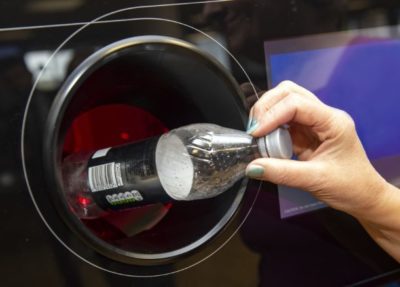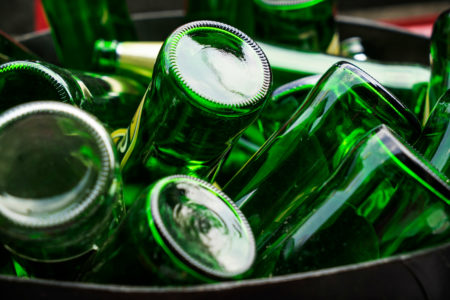Aluminium recycling body Alupro has hit out at plans for an ‘all in’ Deposit Return Scheme (DRS) planned for Scotland in 2021, saying it could increase the use of plastic bottles.
This follows similar warnings from the glass industry in recent weeks, as criticism of how a DRS will operate ramps up.
Earlier this year, Scotland indicated that it would introduce a redeemable deposit of 20p on all drinkers containers between 50 millimetres and three litres in size by 2021.

A DRS sees a deposit paid on the purchase of a packaged drink, which is then refunded when the packaging is returned
While nothing has been confirmed for the rest of the UK, the majority of respondents to the consultations this year backed an ‘all in DRS’, while then environment secretary Michael Gove also threw his weight behind the idea too (see letsrecycle.com story).
Alupro
Alupro- the Aluminium Packaging Recycling Organisation – claims that charging a 20p deposit per drink on a multi-pack of aluminium cans, for example, would add £2.40 to the cost and would encourage consumers to buy bigger plastic bottles.
The organisation released a survey today which found that two thirds of the 2,000 adults questioned who are currently buying multipacks of cans would switch to plastic if faced with this choice.
Alupro says this could mean an extra 823 million plastic extra bottles will be released a year. It also released the below infographic, highlighting the key issues.

Alupro released this infographic saying an extra 823 million plastic bottles could be produced (click to enlarge)
Its executive director, Rick Hindley, said: “We are very concerned that if the same deposit fee is applied regardless of container size, it will have a significant impact on multipacks of aluminium cans. The majority of consumers buy multipacks, and these will become twice as expensive as the equivalent volume in plastic if a deposit return scheme is introduced with the same deposit fee.
“This would be a significant upfront cost for household budgets and, as our survey has confirmed, it will influence purchasing habits.”
Instead of the flat rate, Alupro are calling for a variable deposit to combat these potential issues.
Glass
The glass industry has highlighted similar concerns about a DRS shifting consumers towards plastic packaging (see letsrecycle.com story).
And, research carried out by consultants Oakdene Hollins for the European Container Glass Federation (FEVE) also suggested that Scotland would already meet its EU targets for glass packaging recycling through the current PRN system, whilst the need for kerbside collections to run alongside DRS to collect out of scope materials would “jeopardise” current local authority provisions.
The report also suggested that Scotland’s DRS would not lead to producers paying the ‘full net costs’ of recycling, known as the ‘polluter pays’ principle.
Instead consumers would be the main funders of the DRS unredeemed deposits. With a best practise capture rate of 90% this would amount to £33.9 million of funding annually, increasing to £67.8 million at an 80% capture rate. The DRS is set to cost £80.7 million per year to run.
‘Unverified’ figures
Glass sector trade association British Glass have this week also hit back at figures on Zero Waste Scotland’s suggestion that its DRS would lead to carbon savings.
Zero Waste Scotland have stated that 1.3 million tonnes of CO2 will be saved over 25 years through a DRS, part of its claim that the scheme is “best for planet and consumers”(see letsrecycle.com story).
“Including glass will save less than 0.25m tonnes over 25 years..making Scottish Government estimates some 500% wide of the mark”
Dave Dalton, chief executive of British Glass, said: “We have been unable to obtain verification of the 1.3m tonnes of CO2 that ZWS claim will be saved over 25 years – or 52,000 tonnes of CO2 per year – by including glass in the scheme.
“At best, including glass will save less than 0.25m tonnes over 25 years or around 9,300 tonnes per year, making the Scottish Government estimates some 500% wide of the mark.”
The post Deposits for drinks cans ‘will boost plastic use’ appeared first on letsrecycle.com.
Source: letsrecycle.com Packaging



